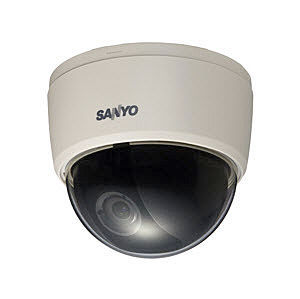Dual Power CCTV Cameras
 CCTV engineer Steve had trouble with a CCTV system in a housing association. His findings concluded that the system requires a new power supply as cameras were not receiving power from the power box. He immediately noticed that instead of 12V cameras, 24V cameras were installed.
CCTV engineer Steve had trouble with a CCTV system in a housing association. His findings concluded that the system requires a new power supply as cameras were not receiving power from the power box. He immediately noticed that instead of 12V cameras, 24V cameras were installed.
Are there any benefits? Lets us look into 24V and 12V cameras.
Dual power cameras
24V cameras are also known as dual power cameras. These cameras often support both 24V and 12V (dual). You can see the voltage requirements either on the back of the camera or in the camera’s manual (e.g. 12VDC or 24VAC). AC stands for Alternative Current voltage which can be increased or decreased by adding a transformer. AC is commonly applied in transmitting the voltage for a long distance.
Advantages of using a dual power camera
It is highly advisable to use 24V cameras if they are to be installed with a great distance, often more than 100 meters. Using 24V you can run the wires for a long distance and send power with less voltage drop.
Moreover, in general, 24V cameras last longer than 12V cameras and are ideal for outside or large installations. Most dual power cameras in the market come with additional features such as menu setup, digital zoom etc. You can also adjust settings such as colour, contrast, brightness etc. through the camera menu.
Advantages of using a 12V camera
12V cameras are more commonly over 24V cameras. They are cheaper than 24V cameras and are easily upgradeable. As most types of surveillance equipment such as detectors, microphones, bells etc. run on 12V, it’s easier to integrate into the system or upgrade the whole setup.
Cameras can be powered by using a 12V output CCTV power junction and if you install microphones and other devices along with cameras, you can power all the equipment through one power supply.
Power supply
Power supplies play a huge role in selecting cameras, if you use a 12V output power supply, it’s advised to buy 12V cameras, as this will make your installation much easier. If you use 24V power supply, then you should definitely consider 24V cameras or dual power cameras.
In conclusion
A comprehensive CCTV survey tells you which cameras to select. 24V cameras are typically used in larger projects such as installing a CCTV system at a busy and large railway station or bus station.
In such situations, you will be required to install the cameras outside and they will probably be securely installed on a pole so you will need more durable surveillance equipment which is why 24V cameras are preferable.
If you are considering a small project for example installing cameras at a takeaway outlet, 12V cameras would be ideal.
In Steve’s case, he needed to install a 24V power box and cameras were back in action.
Learn the ins and outs of CCTV installation
Join our next CCTV Installation and Maintenance Course and get qualified in two days. Learn the details here: CCTV Installation and Maintenance Courses at F R Joseph Anton Ltd.
